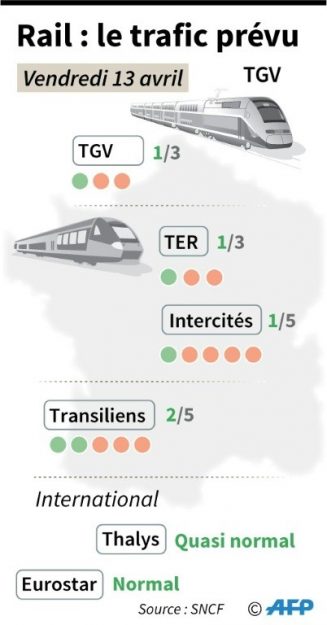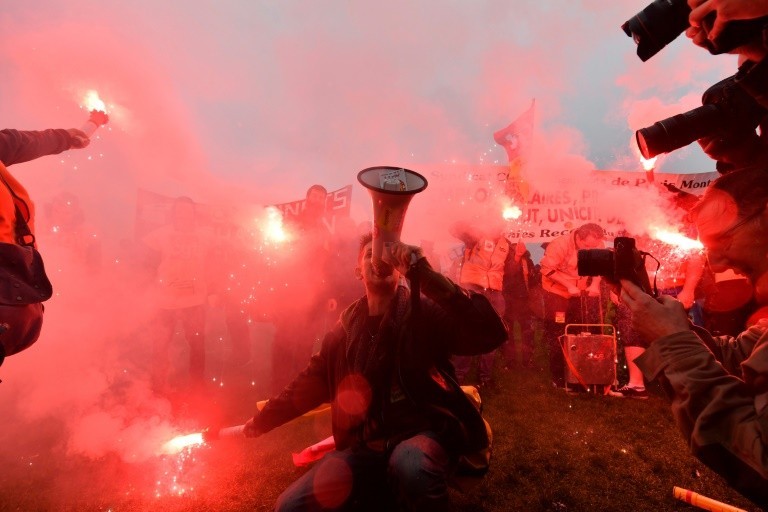SNCF: The Traffic Still Disrupted on Saturday, the Unions Want “Deep Negotiations”

After the third episode of the railway workers’ strike, which began Friday (April 13th), SNCF traffic remains disrupted on Saturday. Update on traffic conditions
The railway traffic will remain disrupted Saturday , but Friday a lesser extent for the third episode of the strike at the SNCF, continuing unions to request the opening of “extensive negotiations” against an inflexible executive.
Saturday, the second day of this third strike, traffic will be disrupted on domestic routes: a TGV and a TER out of three, two Transilien oot of five and an Intercity train in five, announced the SNCF, while the holidays begin in school Zone C . On the international side, there will be 4 out of 5 Eurostars, but Thalys traffic will be “almost normal”.
The inter-union CGT, UNSA, SUD Rail and the CFDT asked on Friday in a statement “the end of the ongoing legislative process” to reform the SNCF and “the opening of in-depth negotiations”, calling on railway workers to “boost” the mobilisation.

“All together, general strike”
From the interview of President Macron, who said Thursday that he wanted to “go to the end” of the reform , “we were not expecting anything and we did not have anything”, summarized Bruno Poncet, federal secretary of SUD-Rail, margin of an event gathering several hundred people – railwaymen, students, postal workers and health staff – Friday in Paris.
Railwaymen in the lead, brandishing SUD-Rail and CGT-Cheminots flags, the demonstrators marched without incident from the Tolbiac metro to the Austerlitz station. “True democracy, it’s here,” “All together, general strike,” shouted the protesters.
For 20 years at the SNCF, a passenger train driver at the Gare Saint-Lazare in Paris, said to be on strike “every day” since the beginning of the movement, following the call for an indefinite strike in the south of France. He draws “in (s) savings” to compensate for the loss of salary: “And I’m not the only one” to strike non-stop to defend the public service, he assured AFP.
Several strike funds were opened to support the railway workers , including one, launched by about thirty intellectuals collected more than 730,000 euros.
The rate of strikers stood in the morning at 22.5%, according to the SNCF. This rate reached 38% for the staff needed for train traffic, with 66% of drivers, 60% of controllers and 29% of switch drivers. Figures all down.
This third episode of strike launched in early April by the trio CGT, UNSA and the CFDT will end on Sunday morning.

“Reorganize”
President Macron had described Thursday as “indispensable” the reform of the SNCF, which “must reorganize.”
The status of railway workers will be retained for those who “came back with” to SNCF, and even for those who will be transferred to another company after opening to competition, he had said. So, “they are just told to accept” the removal of status for “new” hires, whose contracts will be based on the collective “convention” of rail transport, yet to be defined.
On this subject, Roger Dillenseger, Unsa railway (2nd union at the SNCF), claimed on Friday a “method agreement that will define where and when we will negotiate.”
To say that “only the new entrants” will be “impacted” by the suppression of the “is false” status, retorted Thursday by SUD-Rail (3rd union) because Élisabeth Borne, the Minister of Transport, and Guillaume Pepy, the boss of the SNCF , “Both confirmed the future repeal of the decree establishing the statute”.
he Head of State had also indicated that the debt of the SNCF (some 50 billion euros) would be taken partly “from the beginning”, then the rest “gradually”, depending on the progress of the reforms.
The delegate general of LREM, Christophe Castaner, refused Friday to quantify this part of debt taken over by the state, stressing that the state had committed to a “principle”.
For CGT Cheminots (1st union), President Macron “probably does not control the reform file”. The CFDT Cheminots (4th) is it “even more determined”, even if Ms. Borne retained “some of her proposals”.
The number one CFDT, Laurent Berger, nevertheless welcomed “early progress” with the inclusion in the Assembly of amendments brought by the CFDT railway workers. But if “there were points in the law,” Mr. Dillenseger acknowledged, “we are very far from it.”
The bill of rail reform will be the subject of a solemn vote on Tuesday in the National Assembly.
Enjoyed this? Get the week’s top France stories
One email every Sunday. Unsubscribe anytime.


